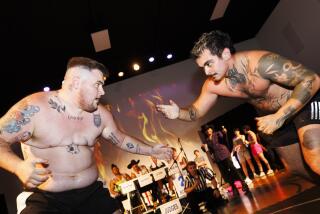A frat for misfits at Ole Miss
- Share via
Oxford, Miss. — THE Ole Miss Rebel football team had taken a 7-0 lead over rival Mississippi State when a strange cheer erupted in a corner of the Rebels’ home stadium.
It was emanating from a small group just behind the marching band’s tuba section. A dreadlocked South African named Badidile Mazibuko was leading it.
“Ozzy Ozzy Ozzy!” Mazibuko yelled.
“Oi! Oi! Oi!” his friends responded.
“Ozzy!”
“Oi!”
“Ozzy!
“Oi!”
It was, to say the least, out of place at a Southeastern Conference football game. Other fans turned their heads toward the shouting and stared.
Who were these people, standing among the blue-blazered fraternity guys and their smartly dressed sorority dates? After all, this was an Ole Miss game -- that famous, and sometimes notorious, celebration of Southern identity. This is where controversy raged over the banning of the Confederate battle flag in the late ‘90s, and where it simmers still whenever the band plays “Dixie.”
Ozzy? Oi?
This was something new. In fact, it was the University of Mississippi’s newest fraternity -- a motley gang of international students and domestic square pegs who, in America’s season of Borat, has cheekily christened themselves the Awesome Dudes of Alpha Delta.
The Awesome Dudes became an official student group at Ole Miss in September. Their goals were modest: to have a good time, and to claim a piece of Ole Miss tradition -- the ritualized sis-boom-bah of game day -- as their own.
Their name was self-consciously dorky -- a nod to a few members’ less-than-perfect English skills. It was also meant to both honor and mock, if ever so gently, the insular, exotic and sometimes baffling Greek culture they encountered on campus.
Fraternities and sororities at Ole Miss date to the 19th century. They remain serious business here, with big, white-columned houses, elaborate rules for rushing and pledging, and a history of turning out the state’s future leaders: U.S. Sen. Trent Lott was a Sigma Nu. His fellow Republican and Mississippian, Sen. Thad Cochran, is a former president of Pi Kappa Alpha.
“We don’t have anything like this in Europe,” said Florian Schnitzhofer, a founding Dude from Austria.
The Dudes have no frat house. Nor are they sanctioned by the Greek councils on campus. Membership is free, everyone is considered “president,” and women are welcome: the official name, in fact, is “The Awesome Dude Fraternity/Sorority of Alpha Delta.”
Its mission, according to its website: “spreading the multicultural, multiethnic, multiracial message of unity and love for all.”
Its philosophy: “We all party the same regardless of color or creed.”
There has been some grumbling about the concept of an alternative fraternity. After the student newspaper wrote a story on the Dudes, one reader, commenting on the Web, called them “ridiculous.”
“Greek letter societies were based on things much deeper than what they are trying to base this group on,” the anonymous student said. “These people need to grow up.”
But others have been more welcoming.
The Dudes, it seems, have stumbled on a political correctness that goes down easy on this conservative Southern campus. It’s “We Are the World” served up with a worship of all things football -- and an insatiable thirst for domestic beer.
“All we’ll judge you on,” said South African Alexis Assimacopoulos, hoisting a Rebel-red party cup after the game, “is how well you party.”
THE University of Mississippi opened in 1848 to educate the scions of the antebellum planter class. The legacy of exclusivity lives on in the predominantly white fraternity and sorority houses that occupy prime real estate on the pretty, tree-studded campus.
More than 3,600 of Ole Miss’ 14,000 undergraduates are members of fraternities and sororities. The Princeton Review, which ranks Ole Miss a Top 10 party school, cites the Greeks as “integral to the action.”
Membership provides entry into social networks built and sustained by generations of Southern elites. It also provides a social calendar centered on invitation-only parties and organized tailgating during football season.
The university was desegregated in 1962 with the enrollment of James Meredith, its first black student.
As the black student body grew, African Americans established their own fraternities and sororities. Today, blacks and whites, with a few exceptions, tend to stick to separate Greek systems.
When Mazibuko arrived in August, he asked students of both races about the separate clubs. They told him it had more to do with social preferences than with overt racism.
Mazibuko, 22, is a black man who spent his early days in an apartheid-era township. Still, he was baffled.
“They’d say, ‘Oh, we have cultural differences,’ ” he said. “But come on -- you’re all Americans. I mean, in South Africa we have 11 different languages. That’s differences.”
Mazibuko and other foreign students visited a number of the frat houses and were greeted warmly. But they realized that it would be difficult to join, even if they were asked. The process of rushing a Greek house at Ole Miss stretches over a month, with mandatory meetings and dress codes. Some of the foreign students were here for only a semester -- and few could afford the monthly fees, which start at about $400.
So the Dudes were born after a late-night drinking session.
By November, they had a website, a plan to donate to charities, and more than 80 members -- an enviable size for a legitimate Ole Miss fraternity.
Two in five of them are Americans. They are students like Mark Freeman, a 20-year-old freshman who fought in Iraq before starting college. After the military, he wasn’t about to subject himself to the rigors of pledging a traditional frat.
Two in five are also women -- self-proclaimed “Dudettes.” Jessica Beck, a freshman from Pontotoc, Miss., is studying German and Russian, and likes the fact that she can practice with native speakers. Joining a traditional sorority, she said, “takes too much time.”
Without the benefit of a house, a core group of Dudes gathers most days at the Paul B. Johnson Commons cafeteria among the lower classmen on university meal plans. Here they hold court, comparing notes on Mississippi life between trips to class.
South African Ruan Boshoff, 23, thought radio programming would be “more jazzy” in the birthplace of the blues. Schnitzhofer, the Austrian, marveled that so many different kinds of food could survive deep-frying.
Carlos Aportela and Gerardo Fonseca, 18-year-olds from Mexico, arrived fall semester to find tensions running high over illegal immigration. They found safe harbor with the Dudes.
“No offense,” Aportela said. “But a lot of people from here don’t like us.”
Assimacopoulos of South Africa was surprised that his roommate -- a Mississippi resident and avowed creationist -- was doing just fine in an undergraduate biology class.
Jamie Wellen, 21, from Britain, learned that when a Mississippian calls him a “Brit,” it’s best not to call him “Yank” in return.
“That doesn’t go over very well,” he said.
The Dudes have also learned that at Ole Miss, everything in autumn revolves around football. Many of them didn’t know the rules before they got here, but some had a head start from PlayStation and American TV.
But by late season, most had a pretty good grasp of the game.
Late last month, on the Saturday of the Mississippi State game, the Dudes began drinking around 11 a.m. -- two hours before kickoff. They weren’t alone: Their base was a tent they had set up at the Grove, the grassy open area in the middle of campus. On game days, it is transformed into a huge outdoor cocktail party for thousands of students and alumni.
Schnitzhofer, 24, kept an admiring eye on the opposite sex. It was a bright, warm morning. Many of the Ole Miss sorority sisters favored knee-length cocktail dresses, thigh-high boots, and aviator sunglasses.
Schnitzhofer kept his distance. He had heard rumors that these women were taught arcane Southern manners in their sorority houses: to never drink beer from a bottle, to never smoke standing up. (Jena Gaines, a staff advisor to the sororities, acknowledged obliquely that some sororities give pointers in etiquette.)
“They are beautiful,” Schnitzhofer said, smiling. “Untouchable, but beautiful.”
Assimacopoulos, 24, is rotund, sarcastic, Falstaffian -- the Dude who unapologetically eats his pizza in four-slice stacks. He was dressed in a dark blazer, blue and red striped tie, and an Ole Miss baseball cap. His dark curly hair escaped along the sides.
He looked like John Belushi aping a fraternity guy. Assimacopoulos said that was exactly the point.
“I’m looking at this as a parody,” he said. “I don’t want to have to pay for my friends.”
As per tradition, the Ole Miss football team marched through the Grove on their way to the stadium. The crowd cheered ecstatically, reaching out to low-five the players’ outstretched palms.
Mazibuko rushed toward the procession with a dozen fellow Dudes.
“Go, Rebels!” he roared.
A few beers later, they filed into the bleachers behind the tubas. Fans nearby wore stickers calling for the reinstatement of “Colonel Reb” -- the old mascot who was retired because some thought he resembled an antebellum plantation owner.
Florean Rosenbaum, 26, a Dude and a Fulbright scholar from Germany, thought he’d found a practical solution. “Why don’t they just make him a black guy?” he said.
It was a glorious day for football, and the Rebels did not squander it. When the team went up 19-10 in the fourth quarter, Mornah Dekuwmini, a 25-year-old from Ghana, did a little dance on the bleachers.
This time, he and the Dudes belted out a more familiar cheer. They had spent the early weeks of the season memorizing it in their dorm rooms:
Hotty Toddy, God almighty,
Who the hell are we? Hey!
Flim fam, bim bam
Ole Miss, By Damn!
It is an innocent and beloved bit of nonsense, although in the past it had been employed outside the realm of football. White students chanted it at Meredith when he walked on campus in 1962 with a federal escort, according to “The Band Played Dixie,” Nadine Cohodas’ 1997 history of Ole Miss.
The Rebels went on to win 20-17. The Awesome Dudes of Alpha Delta spilled back onto the Grove among the rest of the revelers, and gathered around their cooler of beer.
A few feet away, the members of the all-white Alpha Tau Omega fraternity were celebrating in a tent festooned with the state flag, which incorporates the old Confederate banner in the upper left corner. “Heritage, not hate,” one of the members said.
ATO Brandon Lockhart, a fifth-year senior, said that Ole Miss frats take a lot of unfair criticism for being racist and elitist. All of these guys are children of the ‘80s, he said. It’s not like it was.
His glanced across the pathway at the new frat in town, that veritable United Nations huddled around the cooler. Lockhart delivered a live-and-let-live verdict: “Sweet.”
TWO nights later, the Awesome Dudes had taken over the Levee, a cavernous dance club preferred by the legitimate fraternity set.
Schnitzhofer, in a “Hustler” T-shirt, was sandwiched between two pretty girls on the dance floor, grinding lasciviously to a bass-heavy Southern rap song.
Assimacopoulos was celebrating diversity by drinking repeat rounds of a Kentucky bourbon that is hard to find back in Johannesburg.
Someone asked Rosenbaum if this was an Ole Miss frat party or an arch send-up of the same.
“It’s hard to tell the difference!” Rosenbaum shouted over the booming bass. “And that’s a good thing, isn’t it?”
More to Read
Get our high school sports newsletter
Prep Rally is devoted to the SoCal high school sports experience, bringing you scores, stories and a behind-the-scenes look at what makes prep sports so popular.
You may occasionally receive promotional content from the Los Angeles Times.






